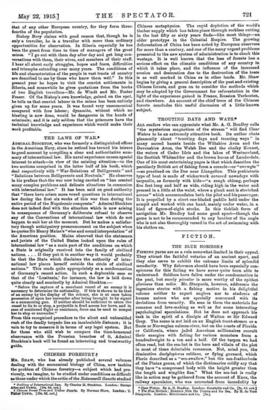THE LAWS OF WAR!
ADMIRAL STocirrote, who was formerly a distinguished officer in the American Navy, since he retired has turned his leisure to good account by compiling a clear and authoritative sum- mary of international law. His naval experience causes special interest to attach—in view of the existing situation—to the two sections comprised in the latter half of his book, which deal respectively with " War-Relations of Belligerents " and "Relations between Belligerents and Neutrals." He observes in his preface that the war now being carried on "bas created many complex problems and delicate situations in connexion with international law." It has been said on good authority that "there have arisen more vexed questions in international law during the first six weeks of this war than during the entire period of the Napoleonic conquests." Admiral Stockton does not indeed deal with the situation which is now arising in consequence of Germany's deliberate refusal to observe any of the Conventions of international law which do not happen to snit her at the moment. But he makes a satisfac- tory though anticipatory pronouncement on the subject when he quotes Sir Henry Maine's "wise and sound interpretation " of the American position. Maine observed that the statesmen and jurists of the United States looked upon the rules of international law " as a main part of the conditions on which a State is originally received into the family of civilized nations. . . . If they put it in another way it would probably be that the State which disclaims the authority of inter- national law places herself outside the circle of civilized nations." This reads quite appropriately as a condemnation of Germany's recent action. In such a deplorable case as that of the `Lusitania; for instance, the law is laid down quite clearly and succinctly by Admiral Stockton :— " Before the capture of a merchant vessel of an enemy it is necessary to determine its nationality, If this ie shown to be that of an enemy by the display of the colours, she is at once taken possession of upon her surrender after being brought to by signal er a summoning gun. If neither should be sufficient to cause the vessel to lie to or stop, a projectile is fired across her bows, and in case of continued flight or resistance, force can be used to compel bar to stop or surrender."
From this recognized procedure to the silent and unheralded rush of the deadly torpedo lies an incalculable distance; it is vain to try to measure it in terms of any legal system. But for those who still wish to compare the time-honoured observance with the Prussian breaches of it, Admiral Stockton's book will be found an interesting and trustworthy guide.


































 Previous page
Previous page